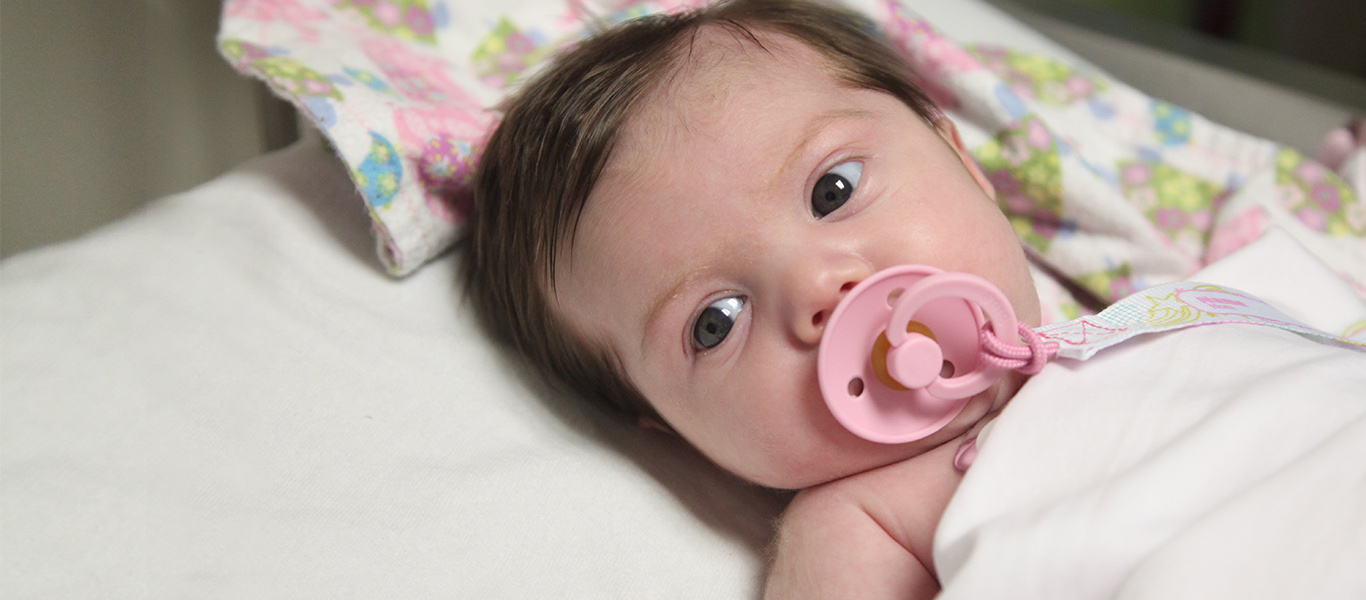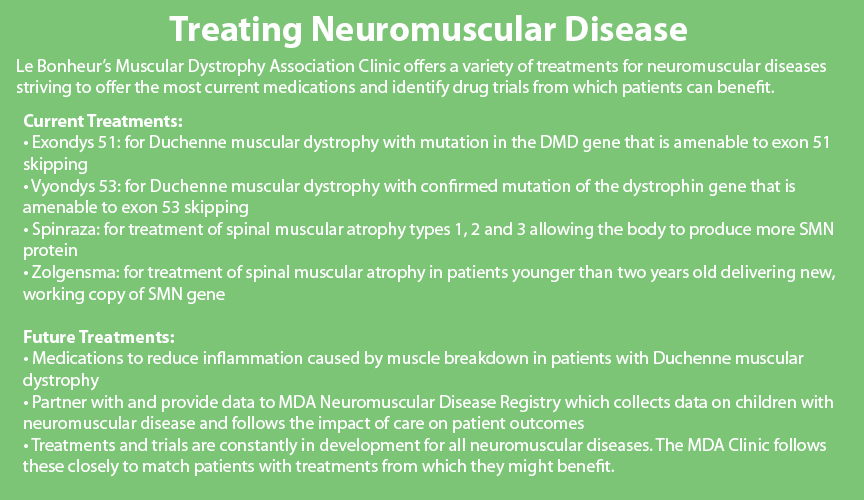One in Ten Thousand
As the state of Tennessee finalized the newborn screening process for spinal muscular atrophy (SMA), 10,000 random samples were pulled for quality assurance testing. Charleigh Jones’s sample was one of them.
Diagnosed through the screening with SMA type 1 – a genetic condition characterized by increasing muscle weakness and early morbidity – Le Bonheur neurologists worked with Charleigh’s pediatrician to intervene with a brand-new gene therapy, Zolgensma, to save Charleigh’s life.
In December 2019 at 8 weeks old, Charleigh was the first Le Bonheur patient to receive this infusion delivering the gene that Charleigh is missing. This stops SMA in its tracks by preserving motor neuron cells, improving motor function and allowing her to reach childhood milestones like sitting without support.
Charleigh is one of many children who have entered Le Bonheur’s Muscular Dystrophy Association (MDA) Clinic for comprehensive care. Thanks to a multidisciplinary approach, children with neuromuscular conditions have access to a variety of specialists and support services.
A Grim Diagnosis
Prior to the screening, no one suspected Charleigh’s SMA diagnosis. The state lab contacted Le Bonheur Neurologist Elena Caron, MD, and her team who alerted Charleigh’s pediatrician with the screening results and scheduled an appointment for her at the MDA Clinic two days later.
SMA type 1 is a genetic disease caused by a missing or nonworking SMN 1 gene responsible for making SMN protein. If left untreated SMA type 1 leads to death or the need for permanent ventilation by the age of 2 in more than 90% of cases.1
Zolgensma protocol calls for a one-time, one-hour intravenous infusion followed by a 24-hour inpatient observation period. Candidates must meet multifaceted criteria to be eligible for the drug. Zolgensma delivers a new copy of the deleted SMN gene through a viral vector, AAV serotype 9, providing a functional copy of the SMN gene to instruct cells to produce the protein needed to keep anterior horn cells of the spinal cord alive.

Nine days after her diagnosis, Charleigh was at Le Bonheur Children’s for her infusion.
“I’m thrilled we were able to accomplish this so quickly,” said Caron. “It felt like a race against the clock – every day mattered. We had to act as quickly as possible to help achieve the best outcome for Charleigh.”
While the infusion will not cure Charleigh of the disease, it will halt her symptoms so that she is able to continue to achieve childhood milestones and preserve her muscle function. Clinical data from the trial of Zolgensma showed unprecedented rates of survival, rapid motor function improvement and milestone achievement.
A Multi-Disciplinary Approach
All children who receive the Zolgensma infusion, including Charleigh, are followed in Le Bonheur’s MDA Clinic where children with neuromuscular diseases, like SMA, receive supportive care. While a plethora of treatment options are available to children, no cures exist for these neuromuscular diseases.
While drug treatments do provide a drastically improved prognosis, good preventative care is required to sustain these benefits.
“The goal of our MDA Clinic is to care for medically complex kids, giving them the resources and support they need to live their life to the fullest,” said Caron. “We are committed to a preventative and mindful approach to provide meticulous care for our patients to get the maximum benefit from drug treatments.”
The clinic provides all specialties needed for neuromuscular disease patients in one place and during one appointment. This includes specialties of neurology, pulmonology, cardiology and orthopedics as well as additional resources such as physical and occupational therapy, nutrition, social work, palliative care and orthotics and equipment.

The structure of the clinic also allows providers to collaborate with one another, hearing concerns from other specialties and enacting preventative measures for these medically complex children.
“Studies show that children do better with multidisciplinary care,” said Caron. “This approach allows us to provide the best outcomes for children and prevent complications that can arise from their neuromuscular disease.”
In addition to the clinical aspects, Caron and her MDA team are actively involved in going beyond the walls of the clinic to support the places where their patients live. This includes educating the school system on what accommodations children with neuromuscular disease need in order to participate on the same level as their peers.
Strides in Neuromuscular Treatment
While current treatments are not cures for neuromuscular diseases such as Charleigh’s SMA type 1, certain FDA-approved treatments can mitigate the morbidity associated with a wide variety of conditions. In addition, studies are ongoing across the country that address neuromuscular disease causes at a genetic level.
“Our goal is to be preventative and mindful in the treatment of our neuromuscular patients,” said Caron. “We constantly push our patients’ care to get their treatment to the place where they can participate in their age-appropriate activities and do all that is possible for them to do.”
Future care for neuromuscular disease takes many forms. MDA clinic patients are eligible for enrollment in the MDA Neuromuscular Registry as well as other large patient registries for specific neuromuscular diseases that study long-term outcomes. These registries allow Caron and her team to have a database of patients and their gene defects so that the team can reach out immediately when new treatments are approved or trials become available for which they are eligible.

The Future of SMA Treatment
SMA is one of the neuromuscular diseases to benefit from recent drug advances such as the Zolgensma infusion. The state of Tennessee added SMA testing to newborn screenings in February 2020. Le Bonheur is a designated treatment site in West Tennessee for children diagnosed with SMA by their newborn screening.
“We anticipate more patients being identified and referred to us through newborn screening,” said Caron. “We will continue to follow infants with SMA and other neuromuscular diseases and provide excellent multidisciplinary care to provide the best outcomes.”
1Finkel RS, McDermott MP, Kaufmann P. et al. Observational study of spinal muscular atrophy type 1 and implications for clinical trials.Neurology. 2014;83(9); 810-7.

Help us provide the best care for kids.
Le Bonheur Children's Hospital depends on the generosity of friends like you to help us serve 250,000 children each year, regardless of their family’s ability to pay. Every gift helps us improve the lives of children.
Donate Now






